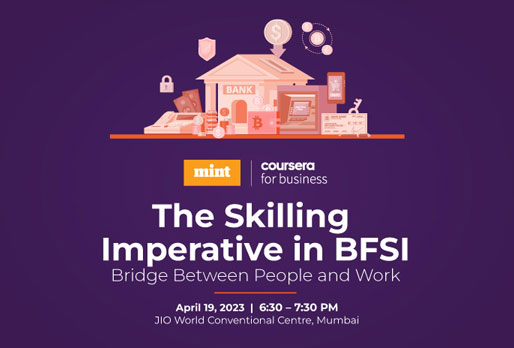By 2050, India will have the third-largest domestic banking sector. Technology-powered digitalization and dynamic consumer demands are driving the rapid growth and expansion of the BFSI industry. While this is great news for the country's economy, the BFSI transformation also poses unique challenges, most prominently being the skills gap. Having said that, how can BFSI navigate through this transitional phase?
Mint, exclusive boardroom — "The Skilling Imperative in BFSI: Bridge Between People and Work," in association with Coursera, constituted on April 19 in Mumbai discussed the same. Raghav Gupta, MD-India & APAC, Coursera and Arushee Aggarwal, Head, Coursera for Business India chaired the event. Sumedha Bose, AGM, Mosaic Digital, An HT Media Group company, moderated the session. The boardroom was attended by the industry's top leaders from different BFSI segments such as insurance and banking.
This exclusive boardroom proved to be an excellent opportunity for HR and Learning and Development (L&D) leaders to discuss, assess and chart how to reskill and upskill their existing workforce. Additionally, it answered how L&D leaders are promoting the advancement of their workforce in a manner that aligns with other critical business objectives such as capability-building and skill development.
Make your inbox more interesting.
Subscribe to our newsletterSumedha Bose kickstarted the discussion by highlighting that the BFSI sector is experiencing rapid change, and as a result, talent strategy must receive the same level of attention and dedication as a business strategy. Unfortunately, many companies prioritize business strategy over talent strategy, leaving the latter overlooked. Since BFSI is the stem cell for all other industries to function, the workforce can no longer be an afterthought.
When probed about the factors driving skilling imperative, one of the L&D heads of a top banking firm acknowledged that the banking industry experienced a crisis 6-7 years ago due to the emergence of fintech, advancements in digital banking, and rapidly changing technologies; catching many banks unprepared. It was evident that the industry was lacking in the necessary skills to cope with these changes. Therefore, the banks started their upskilling journey some time ago. However, as innovations such as ChatGPT emerge, the journey of upskilling remains ongoing. The demand for technology and future-oriented skills continues to rise.
Echoing these sentiments, another L&D chief of India’s leading bank quoted that the biggest imperative is how the sector can provide a workforce with the necessary skills to perform various processes and become future-ready, capable of assuming new roles. Since securing suitable talent for digital, design, and analytics positions is an especially
daunting task in the BFSI industry, as it faces stiff competition from other sectors for top tech talent.
When Sumedha Bose asked about the most significant skill gaps in the industry, an L&D head from a top insurance firm reiterated that-
- With new applications and platforms being launched every second and process becoming increasingly automated, there is a need for all front-line workers to acquire digital literacy skills.
- It is crucial to align learning with job tasks and performance to simplify and demystify the learning process for learners.
- One-third of businesses are tech-based, encompassing fields such as cybersecurity, data science, blockchain, and IoT. Devising a strategy for these areas and developing the necessary talent becomes challenging.
To address the complexities of the aforementioned challenges, Raghav Gupta proposed that in light of the changes brought about by the pandemic in the working culture of the BFSI sector, it is crucial for organizations to prioritize their skilling and reskilling programs. These initiatives should be designed to train both fresh joiners and existing employees for the new-age jobs that have emerged in the sector.
Arushee Aggarwal concurred with the view that business outcomes depend on the employee's ability to perform a role once they enter the position and be able to perform the role once they are fully ready for it. Coursera for Business offers quality content from reputable universities and companies without any compromise. It believes that to succeed in a field, employees must have the necessary skills, be able to transfer them seamlessly and track their progress with ease.
Moving further, an insurance leader emphasized that at the heart of customer experience (CX) lies the employee experience, and to accurately measure the return on investment (ROI) of learning, it's essential to examine both the employee and customer journeys in detail. Additionally, the skill requirements for future jobs will depend on anticipated changes in customer behaviour and evolving business practices.
Summarizing the discussion, Raghav Gupta said that L&D programs must be adaptable to keep pace with the rapidly evolving technology and associated digital skills, enabling the workforce to update their capabilities as needed. Further, attracting new talent and developing new capabilities will only happen in a culture that values innovation.



